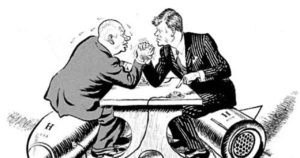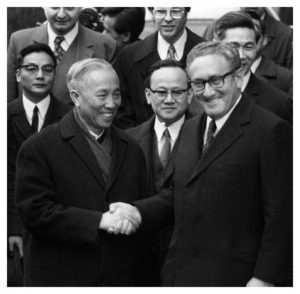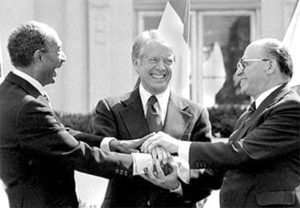Russ Leng
Political Science professor, Middlebury College and
Academy of Lifetime Learning, Cape Cod Community College
Three Classes: Tuesday October 27, November 3, 10 from 10:30 – 12:00
 10/27: Cuban Missile Crisis (1962)
10/27: Cuban Missile Crisis (1962) This game of nuclear “chicken” had moments of misconceived intentions and provocative actions that brought the two superpowers dangerously close to nuclear war. The tapes of Kennedy’s meetings with his “Excomm” advisors, along with documents from the Soviet archives, allow for inside looks at the decision-making of both parties. The negotiations are a fascinating mix of carefully calculated influence attempts coupled with unanticipated events and ambiguous communications.
 11/3: Vietnam War Negotiations (1969-1973)
11/3: Vietnam War Negotiations (1969-1973)
The “back-channel” negotiations between Henry Kissinger and North Vietnam’s Le Duc Tho illustrate the dynamics of negotiation between a traditional statesman and a revolutionary leader, the intersection of war and diplomacy, and the fraught relationship between the U.S. and its South Vietnamese ally. We will conclude by considering whether Nixon and Kissinger believed that they had obtained “peace with honor,” or merely a face-saving “decent interval” before a North Vietnamese victory. Our knowledge of the decision-making on the U.S. side is aided by President Nixon’s practice of taping all his Oval Office discussions.
 11/10: Camp David Accords (1978)
11/10: Camp David Accords (1978)The “framework for peace” between Egypt and Israel, which was mediated by U.S. President Jimmy Carter, led to the most important peace agreement between Israel and an Arab state. Carter’s efforts demonstrate the difficulties of attempting to mediate between two hostile and distrustful leaders, while displaying Carter’s creativity and dogged determination to achieve an agreement. The accords were in two parts: a formula for a peace treaty between Egypt and Israel, and a framework for peace between Israel and Palestinian Arabs. The first resulted in a lasting peace treaty, but how about the second part of the accord? Were all three parties truly committed to its success?